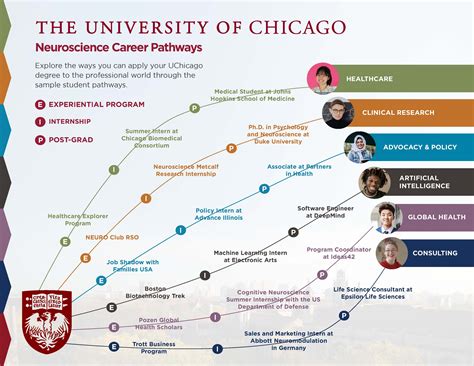Neuroscience, the scientific study of the nervous system, has emerged as a prominent discipline, offering a wide spectrum of career opportunities. With a solid foundation in neurobiology, cognitive science, and behavioral neuroscience, graduates with a degree in neuroscience are well-equipped to pursue diverse and impactful careers across various sectors.

Applications of Neuroscience in the Healthcare Industry
1. Clinical Neurology:
Neuroscientists play a vital role in diagnosing and treating neurological disorders such as Alzheimer’s, Parkinson’s, and epilepsy. They assess patients through neuroimaging, interpret results, and formulate comprehensive treatment plans.
2. Neuropsychology:
Neuropsychologists apply neuroscience principles to understand how brain functions affect behavior and cognitive processes. They assess individuals with neurodevelopmental disorders, acquired brain injuries, and psychiatric conditions to develop tailored therapies.
Frontiers in Research and Academia
3. Neuropharmacology:
Neuropharmacologists investigate the interactions between drugs and the nervous system. They design and develop new pharmacological therapies to treat neurological and psychiatric disorders, contributing to the advancement of medical science.
4. Cognitive Neuroscience:
Cognitive neuroscientists study the neural substrates of cognition, attention, memory, and language. Their research uncovers the intricate mechanisms underlying human thought and behavior, informing the development of educational and therapeutic interventions.
Industry and Technology
5. Neuroengineering:
Neuroengineers combine neuroscience and engineering principles to create innovative devices and technologies. They develop brain-computer interfaces, neuroprosthetics, and neuroimaging systems that enhance human abilities and address neurological deficits.
6. Data Science:
Neuroscience generates massive datasets, requiring skilled individuals to analyze and interpret these data. Data scientists with a neuroscience background contribute to the development of machine learning algorithms for clinical applications, drug discovery, and personalized therapies.
Beyond Traditional Career Paths
7. Neuroscience Consulting:
Neuroscience consultants provide expert advice to businesses, organizations, and policymakers on the implications of neuroscience in areas such as marketing, education, and healthcare.
8. Science Writing and Communication:
Neuroscientists excel at translating complex scientific concepts into accessible prose. They work as science writers, journalists, and communicators, disseminating knowledge and shaping public discourse on neuroscience.
Strategies for Success in a Neuroscience Career
- Acquire a Strong Foundation: Pursue a comprehensive undergraduate or graduate degree in neuroscience, covering core concepts in neurobiology, cognitive science, and research methods.
- Specialize in a Field: Identify a specific area of neuroscience that interests you, and seek opportunities to develop expertise through research or internships.
- Network and Collaborate: Attend conferences, join professional organizations, and establish connections with individuals working in your field.
- Develop Transferable Skills: Cultivate strong communication, analytical, and problem-solving abilities, which are highly valued in multiple industries.
- Stay Updated with Advancements: Neuroscience is a rapidly evolving field. Engage in continuous learning through publications, conferences, and online resources to stay abreast of the latest discoveries and technologies.
Projected Job Outlook and Salary Expectations
According to the U.S. Bureau of Labor Statistics, the median annual salary for neuroscientists was $102,320 in May 2021. The projected job outlook for neuroscientists is expected to grow 10% from 2021 to 2031, faster than the average for all occupations.
The “Neurolution” of Careers
Neuroscience is a field of boundless possibilities, consistently generating new innovations and applications. As the understanding of the brain continues to advance, the “neurolution” of careers in neuroscience will unfold, providing ample opportunities for individuals passionate about exploring the intricacies of the human mind.
Tables for Further Insight
Table 1: Career Options with a Neuroscience Degree
| Job Title | Industry | Median Annual Salary* |
|---|---|---|
| Clinical Neurologist | Healthcare | $211,220 |
| Neuropsychologist | Healthcare | $109,100 |
| Neuropharmacologist | Research | $125,640 |
| Cognitive Neuroscientist | Academia | $88,920 |
| Neuroengineer | Technology | $115,550 |
| Data Scientist (Neuroscience) | Industry | $126,830 |
*Source: U.S. Bureau of Labor Statistics, May 2021
Table 2: Advantages of a Neuroscience Degree
| Advantage | Description |
|---|---|
| Comprehensive Education | Provides a broad foundation in multiple disciplines. |
| High Earning Potential | Neuroscience careers offer competitive salaries. |
| Growing Field | The demand for neuroscientists is expanding rapidly. |
| Transferable Skills | Develops valuable skills applicable to various industries. |
| Intellectual Stimulation | Offers opportunities to explore the frontiers of science. |
Table 3: Steps to Advance Your Neuroscience Career
| Step | Description |
|---|---|
| Earn a Degree | Obtain a bachelor’s or master’s degree in neuroscience. |
| Gain Research Experience | Participate in research projects to develop expertise. |
| Specialize in a Field | Identify and focus on a specific area of interest. |
| Network and Collaborate | Attend conferences and build relationships with professionals. |
| Stay Updated | Continuously read literature and attend conferences to stay informed. |
Table 4: Emerging Applications of Neuroscience
| Application | Industry | Impact |
|---|---|---|
| Brain-Computer Interfaces | Technology | Enhance communication and control for individuals with disabilities. |
| Neuroprosthetics | Healthcare | Restore lost functions in patients with spinal cord injuries or amputations. |
| Neuroimaging for Disease Detection | Healthcare | Improve diagnosis and treatment of neurological disorders. |
| Personalized Medicine | Healthcare | Tailor treatments based on individual genetic and neural profiles. |
| Educational Neuroscience | Education | Optimize learning strategies and improve student outcomes. |
